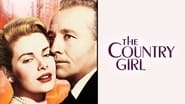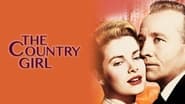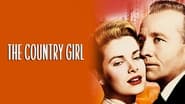Lee Eisenberg
The main thing that one will notice about "The Country Girl" is the unusual roles given to Bing Crosby and Grace Kelly. His Frank is a depressed alcoholic, her Georgie is the unglamorous wife (well, unglamorous by Grace Kelly's standards). And then there's William Holden's Bernie. He's the director of a musical production, convinced that Georgie is the reason for Frank's alcoholism, and intent on making her life a living hell.It was rare for a movie back then to focus on misogyny. I found the scenes in which Bernie berates Georgie to be the most effective in the movie. They were certainly intense. The musical scenes were corny, but the rest of the movie made up for those. As to the question of whether Grace Kelly's performance merited an Oscar win over Judy Garland's performance in "A Star Is Born", I actually found this to be the more important movie; it focuses on a more serious issue.So, it's not the greatest movie ever made but I still recommend it. Just remember that Crosby's and Kelly's roles are not like what we're used to.
lasttimeisaw
A plain reason why I arouse my interest in this film is the controversy of Grace Kelly's Oscar win over Judy Garland in A STAR IS BORN (1954), according to trivia report, a narrow 6 votes altered the result for the jinxed Ms. Garland, who had the best shot in her entire lifetime. But on the other hands 1954 is the prosperous year for Ms. Kelly, with cinema chef-d'oeuvres like REAR WINDOW, DIAL M FOR MURDER, her final victory is quite plausible, just imagine if the prolifically marvelous Jessica Chastain had won over her co-star Octavia Spencer for THE HELP (2011) this year, I doubt there would be a big fuss about it. The film is an adaption of Clifford Odets' most famous play, about a drunkard singer-actor's revival of his plummeting career against his insecurity and impotence for responsibility after a wretched family tragedy. Judging by the title, his wife, a devoted, morally dignified woman, is the linchpin, a paragon wife, undergoes all her tribulation from her husband and at last procures the affection of another man, a divorced director in the Broadway coterie. The 3-triangle team is the backbone of the film, this is my first film starring Bing Crosby, who has a showier role than his co-star Holden, Crosby manifests his talent in dramas, but his role has been overshadowed by Holden and Kelly's showdown, thanks to the self-degrading makeup skill, Grace Kelly sacrifices her beauty and morphs into a woman under the family trauma but still holds steady of her self-respect, William Holden's double-chin hasn't stopped him from being a complete charmer during the sex battle despite of the ambiguous mutual attraction stunt is a turn-off. PS. I'm no stylist, but Bing Crosby's high waist pants are torturing my eyes when they constantly pop up on the screen, I may not be a fashion follower, but this instance speaks for itself of the importance of not looking ludicrous on the celluloid. Likewise, the film has a setback to be digested by a modernized audience, and by far Judy Garland has still been my win in the race.
lauraeileen894
Whenever film articles mentioned mismatched couples on the silver screen (such as Julia Roberts and Nick Nolte in "I Love Trouble" and the travesty that was Bennifer in "Gigli"), I'm always surprised that Grace Kelly and Bing Crosby never get mentioned. After all, you have gorgeous, fashionable, classic blonde Kelly teamed up with jug-eared crooner Crosby, who was 25 years her senior (poor Bing didn't even have the physical vitality of Fred Astaire or Cary Grant to help him pull off a May/December romance on screen). You'd be hard-pressed to find a stranger looking pair, and they worked together twice: in "High Society", Kelly's final film before leaving Hollywood for royalty, and two years earlier in "The Country Girl"."The Country Girl is barely remembered today, save for Grace Kelly's controversial Best Actress Oscar win. Judy Garland seemed like the surefire contender for her comeback vehicle "A Star is Born". Even the flippant Groucho Marx was outraged, calling Garland's loss "the biggest robbery since Brink's". I confess to be in the majority of people who love "A Star is Born", and feel Ms. Garland was indeed gypped by the Academy that year. But I decided to be fair and check out "The Country Girl" and see for myself. So, how does Ms. Kelly's performance measure up?Well, it's by no means a bad performance, it's just not a particularly great one. In "The Country Girl", 25-year-old Kelly plays Georgie Elgin, a prematurely middle-aged woman whose husband, Frank (Crosby), is a former song and dance man whose star has faded due to tragedy and alcoholism. A stubborn, ambitious producer, Bernie Dodd (William Holden), is putting on a new musical (which, from what we're shown, looks incredibly quaint and dull) and is obsessed with making it Frank's comeback vehicle. Bernie believes in Frank, and also believes the dour Georgie is responsible for Frank's drinking and flaky behavior (Holden utters misogynistic lines that will either shock or amuse modern audiences). What unfolds are cruel revelations, sexual tension, and second chances for everyone involved. One of my biggest issues with "The Country Girl" is that it suffers from the same problem as 1940's "Kitty Foyle", in that our heroine is eventually torn between two men, but both men are so unappealing, you desperately hope she ends up with neither (but this is old Hollywood, so consider yourself warned). Georgie must choose between Frank, who is nothing but a millstone around her neck, and Bernie, who is a short-sighted jerk of the highest order (he is given character development, but it's too little, too late).Perhaps I'm just petty, but I believe that "The Country Girl" set an obnoxious precedent for Hollywood actresses that has endured to this day: Want that Oscar? Drab up, and it's as good as yours. Why not? It's worked for Halle Berry ("Monster's Ball"), Charlize Theron ("Monster"), and Kate Winslet ("The Reader"). I believe a performance should come first, a look second. One great example is Olivia de Havilland in "The Heiress". Ms. de Havilland was one of the loveliest leading ladies ever, but she was thoroughly convincing as a dowdy spinster. Her appearance followed her performance, not the other way around. I know Ms. Kelly's choice to shed her normally polished, glamorous image to play a weary frump was seen as gutsy at the time, I wasn't all that impressed. Why? It's Grace Kelly, for Heaven's sake. Even in dumpy sweaters, mousy hair and glasses, she still looks like the future princess of Monaco. Male audience members could even argue that Georgie has the "sexy librarian" look. And, it true, gutless Hollywood fashion, we are given a flashback of Kelly looking predictably radiant and a complete makeover towards the end of the filmOverall? Ms. Kelly is reasonably convincing, but aside from her affected look and her tired voice, it feels more like a show-off piece than an actual performance that leaps off the screen. Likewise, Crosby does his best, but he comes off more as his Father O'Malley from "Going My Way" having a lousy week. Holden is in fine form as cranky, sexist Bernie, who is forced to eat his words in one of the film's most rewarding scenes."The Country Girl" isn't terrible, but it is extremely dreary and outdated. I maintain that Judy Garland should have won for "A Star is Born", a magnificent musical that still holds up today. "The Country Girl", on the other hand, is proof that an Oscar here and there doesn't mean much in the long run.
Robert J. Maxwell
Well, it won Grace Kelly an Academy Award and it's easy to see why. She was delicious in a couple of earlier movies and positively supernal in "Rear Window." Here, too, she's playing against type -- not the glamorous, elegant blond but the beaten-down mousy wife in glasses, holding up her enfeebled alcoholic husband, Bing Crosby. But was she really actress enough for such a melodramatic role? Yes and no. She does okay, slumping her drab way through the role, radiating exhaustion. But when it comes to angry shouting she seems uncomfortable, as if in violation of the rules of the convent school in which she'd been educated.I don't know if that can be held against her. This is from a play by Clifford Odets and so all of the lines sound as if they were written for the stage. Nobody else sound especially natural either. Her worst moment is her most intense -- when the director, William Holden, who's trying to resurrect Crosby's career chews her out, blaming her for all of Crosby's weaknesses. She turns and slaps Holden hard across the face, then says with what intensity she can gather, "Did I forget to tell you I was proud?" That's pretty pompous stuff.With regard to that scene, it's a good illustration of the mediocre and middle-brow talent of the film's director, George Seaton. The pauses after the slap and after the devastating line are long. Very long. The camera lingers on the two figures in medium shot, waiting, one supposes, for the gasps to die down in the audience. You know, a good, efficient director of Grade B movies, which this is, at heart, would have given the audience credit enough to understand this is an important incident and would have edited his way quickly through it. Sam Fuller, nobody's idea of a self-important artist, would have introduced somehow a touch of irony.But director Seaton more or less stumbles through this stagy plot and exercises no discernible imagination in his staging. He's also responsible for the screenplay, which turns far too much time over to Bing Crosby singing vapid songs and cuts out what was one of the most important events in the play -- the scene in which the Holden character provokes the Crosby character into improvising a stunning angry speech in front of the producers. The power of that improvisation leaves the producers speechless and secures the job for Crosby.I remember that scene because many years ago I played Larry the Stage Manager in a college production of "The Country Girl." I was a far better Larry the Stage Manager than Gene Reynolds, who plays Larry the Stage Manager in the movie. I can prove I was better. I even got a fan letter. True, the letter was written by my girl friend, and, true, I had to threaten to pull her hair to get her to write it. But I'm morally certain when she thought about it later, she realized her accolade was justified. It's not a terrible movie, but it's not what it might have been. Holden is constantly on the edge of exploding. Crosby's performance belongs in a movie with Dorothy Lamour. And Kelly's exhaustion is exhausting. Most of the flaws I attribute to the director.






